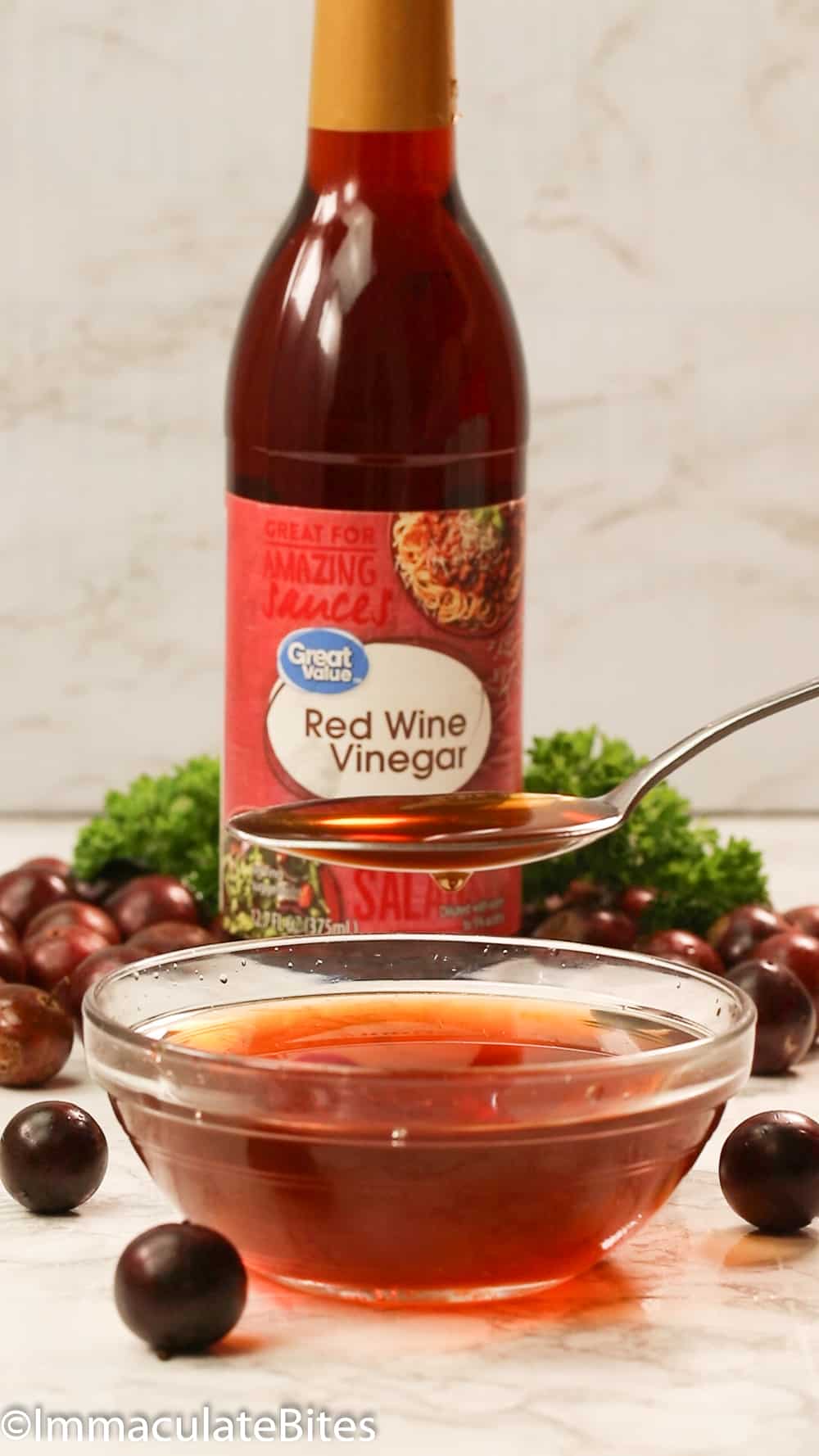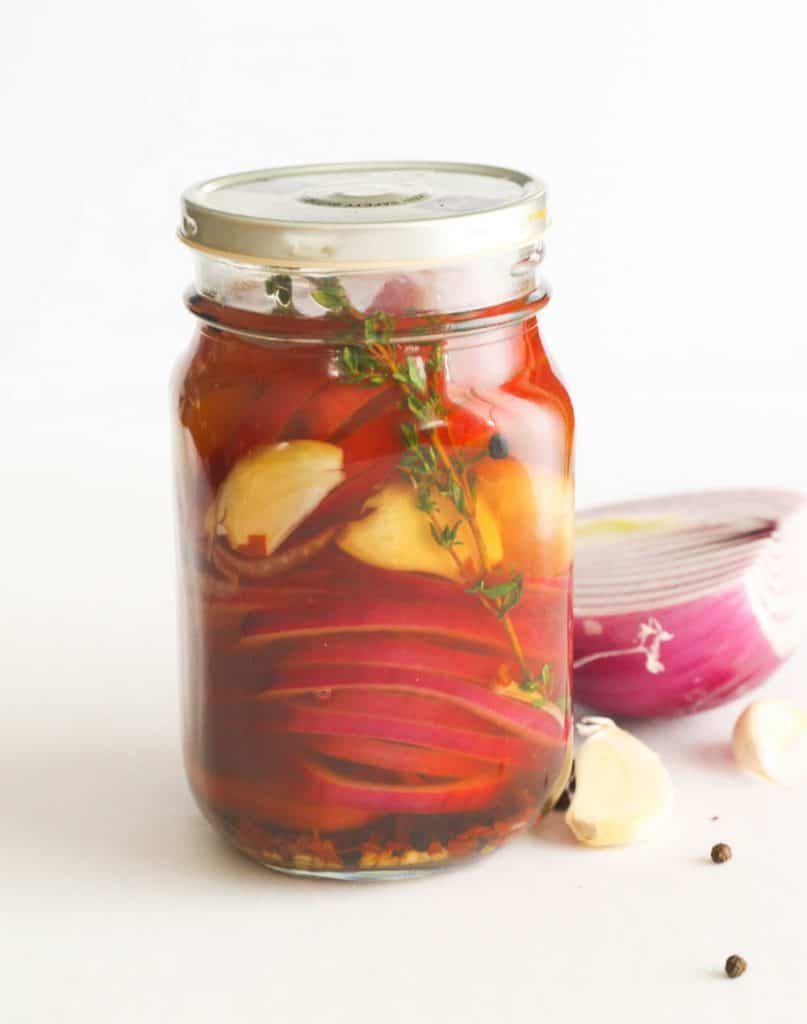Red Wine Vinegar Substitutes – Finding the right red wine vinegar substitute can be easy. Sometimes, we don’t have any on hand or prefer something else to cook with or make our salad dressing or marinade. However, there are things that we can take into consideration before choosing our replacement.
I gladly share what I’ve learned while looking for the best red wine substitute. I hope you find it as helpful as I have. Vinegar is a pantry staple at my house because it has a sharp flavor. I use it primarily for vinaigrettes, marinades, and pickling, but also as a condiment. And I also recommend it for meat to amp up the flavor factor.
What Is Red Wine Vinegar?
Red wine vinegar is made by fermenting grapes (red wine, oh yeah). After you have wine, you let the acetobacters (acetic acid) drink up all the alcohol. I like that job. You can also use other fruit (apples, pineapples, mango, etc.). Balsamic vinegar is comparable, but the flavor is much more intense and has a subtle sweet taste.
Does Red Wine Vinegar Go Bad?
Balsamic vinegar is an excellent substitute because it’s tart. It does tend to be a little sweet, but that has never presented a problem for me. If your recipe has sugar, you may want to reduce it a tad, so it doesn’t turn out overly sweet. Replace it with an equal amount for a savory salad dressing, especially with olive oil.
Tips on Using Vinegar
- To liven food, drizzle it on top of sauteed meat and vegetables. It will bring out the savory flavors of a dish.
- Balance bitterness with vinegar’s sourness for foods like Brussel sprouts, endives, kale, and salads.
- Add crispness to food like pickles, salads, and dressings.
- Tenderize meat because vinegar‘s acidity breaks down the meat’s protein while marinating for a tender and juicy dinner.
- Disinfectant – I like to use vinegar to disinfect foods and food prep areas (distilled vinegar is the cheapest if using it to clean). If you’re cleaning chitlins, it’s a must-have.
Red Wine Vinegar Substitutes
Balsamic Vinegar
Balsamic vinegar is a great substitute because it’s tart. It does tend to be a little sweet, but that has never presented a problem for me. If your recipe has sugar in it, you may want to reduce it a tad so it doesn’t turn out overly sweet. Replace it with an equal amount for a mouthwatering salad dressing, especially with olive oil.
White Wine Vinegar
The counterpart of red wine vinegar is also a fabulous alternative for it. While they differ in color, they have similarities in flavor. Substitute the same amount as the red wine vinegar the recipe calls for.
Sherry Vinegar
Its subtly sweet and rich flavor and acidity are not as strong as red wine vinegar. However, it’s perfect for grilling fish, roasting beef, and marinating vegetables. It also makes delicious marinades and dressings, and a few drops really liven up soups. Substitute red wine vinegar at a 1:1 ratio.
Apple Cider Vinegar
It’s slightly sweeter and fruitier than red wine vinegar, but it still works well with savory dishes (make sure it doesn’t have added sugar). It does have a more robust flavor, so if you decide to use it, start with a third of what the recipe calls for and add more if you want.
Rice Vinegar
This vinegar has a similar acidity to apple cider vinegar and lacks red wine vinegar’s intense flavor profile. That means you may need to increase the amount slightly to substitute. You can start with a 1:1 ratio and then add more if needed. This one goes perfectly with Asian dressings, marinades, and sautees.
Lemon or Lime Juice
Freshly squeezed lemon juice adds a refreshing twist of acidity to your food, making it a fair (though not ideal) substitute for red wine vinegar. The downside is it doesn’t have the rich umami flavor red wine vinegar has. You can successfully use it in small amounts at a 1:1 ratio.
Tamarind Paste
I love tamarind’s sweet sourness. And although I love to use it as a lemon juice sub, I occasionally use it to sub small amounts of red wine vinegar, particularly in marinades. It works best as a meat tenderizer in meat marinades, besides being super yummy. Start with a small amount, and increase until you reach your preferred taste.
Red wine vinegar has a distinct flavor, making it easy to identify. Different kinds of vinegar work for various dishes. What is your favorite way to use red wine vinegar? Let me know below in the comments.❤️





Leave a Review